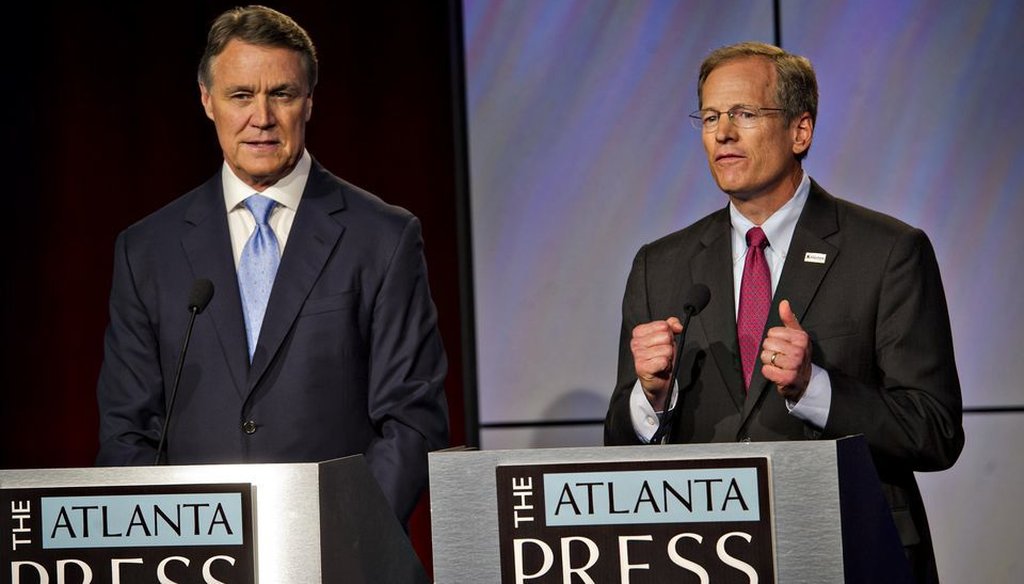Stand up for the facts!
Our only agenda is to publish the truth so you can be an informed participant in democracy.
We need your help.
I would like to contribute

David Perdue, left, and Jack Kingston answer questions at a debate in Atlanta on July12, 2014. (Atlanta Journal-Constitution photo)
Georgia Republicans have watched a bruising contest for their party's U.S. Senate nomination. On Tuesday, voters go to the polls to choose between veteran Savannah Congressman Jack Kingston and millionaire businessman David Perdue.
The two men have been competing intensely since a primary contest on May 20 narrowed the GOP contest to a runoff. The winner takes on Democrat Michelle Nunn, daughter of former Democratic U.S. Sen. Sam Nunn, in November. The competition is for the seat now held by retiring GOP Sen. Saxby Chambliss.
Perdue, a former Fortune 500 chief executive, has depicted Kingston, a 22-year veteran of Congress, as an "out of touch" Washington insider who knowingly took potentially illegal contributions. Kingston has painted Perdue as a gilded executive and an outsider so extreme he’s a renegade.
PolitiFact Georgia has been fact-checking the contest since 2013; here's a look at some of the most significant fact-checks of the run-off.
Perdue didn't vote before his Senate run?
Political wonks know the slur that is a RINO - Republican In Name Only. That was a suggestion in a recent Kingston campaign flier, claiming that Perdue had never voted in a Republican primary until his name was on the ballot.
"I don't vote, but I want yours," said a sign held by Perdue in the flier.
Voting records show that Purdue voted Republican in the presidential primaries in 2008 and 2012. That makes the "never voted in a Republican primary" claim flat-out wrong, earning a rating of False.
Pillowtex
With Perdue going after Kingston's 22-year record in Congress, Kingston has turned his attention to Perdue's mixed business record.
Perdue served nine months as CEO of Pillowtex, a North Carolina textile firm that went under four months after he left.
"Perdue mismanaged Pillowtex and nearly 8,000 people got laid off," said a Kingston ad.
PolitiFact Georgia found that Perdue was the third CEO in two years at the firm. He took over the helm to turn around a company emerging from a bankruptcy caused in part from overwhelming debt and a changing industry. When Perdue and his top manager found a $40-$50 million pension liabiity missed in the bankruptcy records, the owners cancelled Perdue's plan and began a shut down.
About 7,300 workers lost their jobs a few months after Perdue left with a $1.7 million payout in salary and bonus.
The ad, though, claimed Perdue mismanaged the already-troubled company. So we rated the statement Mostly False.
Earmarks, the sequel
Perdue recently leveled an accusation about earmarks, the money lawmakers pull from the federal budget for pet projects in their jurisdictions, saying thata Kingston voted for "thousands" of earmarks in his 22-year congressional career.
Between 2008 and 2011, two databases found Kingston sponsored about 150 earmarks. But Kingston also supported the controversial 2005 transportation bill, a $286-billion plan that contained a record 6,371 earmarks.
But experts noted that even die-hard opponents of pork would have cast votes that included money for state or local projects such as paving roads. Congress votes on such massive spending regularly, as part of its job to handle the budget. PolitiFact Georgia rated his statement Mostly False.
Kingston a "Cash for Clunkers" supporter?
Perdue has claimed in TV ads and mailers that Kingston, a vocal opponent of President Barack Obama, voted in support of Obama's "Cash for Clunkers" program, the vouchers which encouraged consumers to replace less-fuel-efficient vehicles with more efficient models.
Kingston voted against the program twice in 2009, according to the legislative tracking service GovTrack. But he later voted in favor of putting an extra $2 billion into the program when it was clearly foundering.
For that reason, we rated Perdue’s statement Half True.
Did Kingston vote to raise his congressional pay?
Perdue has blasted Kingston for having voted seven times to raise his own pay.
The problem with the claim is that those raises have been automatic since the 1980s, unless Congress holds a specific vote to refuse or reduce them.
Perdue’s attacks are based on procedural votes that Kingston took that effectively blocked others’ attempts to force an up-or-down vote to accept the annual pay raise. There was still a second part to the process: An amendment on the issue would still have to get to the floor and pass before an automatic pay raise could be changed.
Kingston did support some efforts to delay or deny the raises. In 11 years, Congress voted to delay or deny the pay raises with 13 votes. The Congressional Record shows Kingston voted with the majority on eight of those 13 votes.
We rated Perdue’s statement Mostly False.
Would Perdue raise taxes?
Kingston has hammered Perdue over supposed support for a tax increase, a key issue in any Republican race.
Part of the claim stems from Perdue's statements to the Macon Telegraph's editorial board in May, in which said he would support "both" cutting spending and raising revenue to balance the national debt.
Drilling down into those statements, though, makes it clear that Perdue wants to raise revenue by creating more jobs. More people working would translate into more people paying taxes - and more revenue, PolitiFact Georgia found.
But Kingston was right that Perdue stated support for an Internet sales tax at a January candidate forum. Perdue later said he supported taxing goods and services bought on the Internet only as part of a Fair Tax proposal. That effort would replace existing income taxes with a national 23 percent sales tax.
That's not what Perdue said at the forum, though. We rated Kingston's claim Half True.
Did Kingston bring home the bacon?
Perdue is running as an outsider, critical of business-as-usual among longtime politicians.
That tactic came out clearly in a Tweet claiming that Kingston requested more earmarks than any other Georgia congressman and the state's entire Republican delegation combined.
PolitiFact Georgia researched databases and found the claim to be on target. The OpenSecrets.org site revealed that Kingston accounted for $211 million of the $327 million in earmarks that GOP congressmen yanked from the federal budget for Georgia between 2008 and 2011, the only years available in the data.
Another database, from Taxpayers for Common Sense, counted $213 million in earmarks from Kingston in those years, compared to $116 million from the other six Republican congressmen.
Perdue has argued that such spending, outside the normal procurement process that decides the merits and efficiency of projects, can drive up the national debt.
Kingston has argued his earmarks went statewide, not just to his Savannah-area district, and were for mostly military and defense related spending. We rated the claim Mostly True.
Our Sources
See individual fact-checks for sources.


















































